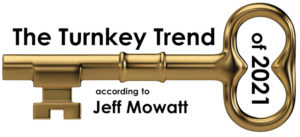Trusted Advisor Customer Service Blog Posts
Written By Jeff Mowatt – (all original content not AI generated)
Written By Jeff Mowatt – (all original content not AI generated)
The Risk of Trusting your Competitor
 If you read business books you may recall the popularity of Sun Tzu’s book, The Art of War. Even though it was written in the fifth century BC, many interpret it in modern times as a primer on how to defeat your organization’s competition. Which raises my question, “How do you view your competitors?”
If you read business books you may recall the popularity of Sun Tzu’s book, The Art of War. Even though it was written in the fifth century BC, many interpret it in modern times as a primer on how to defeat your organization’s competition. Which raises my question, “How do you view your competitors?”
Enemy to be defeated? Company who’s products and services are to be disparaged, particularly to your customers? Outfit that’s trying to steal your secrets, employees, and customers? In other words, you’re at war with the competition.
What if we held a different perspective? What if we actually collaborated with our competitors to grow everyone’s business? Professional trade associations for example, are composed of competitors who may:
- Agree upon industry safety standards and ethical business practices to the benefit of all.
- Lobby governments to create regulations that protect the interests of the country and the industry.
- Share best practices with one another. The idea being you aren’t slicing the pie into smaller pieces for each business. Instead, you’re collectively baking a bigger pie, creating more business for everyone.
- Do business with one another, collaborating on large projects, and referring business to one another when we may not have the capacity or expertise.
- Create personal bonds and friendships with people with whom you share common interests and challenges.
My view - labelling the competition as the enemy is short sighted and small minded. Today’s competitor may become tomorrow’s business partner. Focus more on satisfying your customers than on slamming your competitors. I can attest firsthand to the significant amount of business I’ve received from and referred to my competitors in the training industry. I’m also a long term active member in my association, the Canadian Association of Professional Speakers (CAPS). On a personal level, some of my closest friends are my competitors.
Even if you aren’t part of a formal trade association, if your customer has a need you can’t satisfy, then I believe it still makes sense to recommend a competitor. Not recommending a competitor is tantamount to leaving a customer high and dry and admitting that you don’t know your industry. There’s little probability the customer will ever give you another chance. On the other hand, when you help your customer find a supplier that can assist them, they recognize your service as being helpful, and in future they may give you another shot. So, you have nothing to lose and potentially something to gain by recommending a competitor.
We all have a choice on how to compete in today’s marketplace. We can take cover behind a shield of scarcity and adversity. Or we can take action and embrace a mindset of abundance and collaboration. Both have risks. But one is certainly more fun, and in my experience significantly more profitable.
What if you took one day away for this?
As a manager, would you consider yourself to be more focused on your organization’s day-to-day operations, or are you more focused on long-term strategies? Put another way, how much time do you spend working in the business vs working on your business?
If you’re a manager in a small to medium-sized organization, you don’t have the time to exclusively focusing on strategy. There are customer projects that need your attention, people issues that arise, and proverbial fires to put out. Often we get so caught up in operations that we neglect to step back and see if that particular operation is taking us in the right direction.
That’s why in my upcoming seminar for leaders and supervisors we invite you to take one day from working in your business to instead focusing on your business. You’ll discover a turnkey system that when you incorporate it, ensures your team will consistently be aligned with your customer's changing needs and service expectations. The bonus is it only take 90 minutes a month. Details are at Leading a Customer-Focused Team .
A Common Assumption that Ruins Reputations
 Ever borrow something and then realize weeks or months later that you forgot to return it? Since they haven’t mentioned it, you might assume they’ve probably forgotten about it. So, you decide to hang on to it. If they do bring it up, you can feign innocence, claim that it completely slipped your mind, and offer to return it right away. No harm done, right?
Ever borrow something and then realize weeks or months later that you forgot to return it? Since they haven’t mentioned it, you might assume they’ve probably forgotten about it. So, you decide to hang on to it. If they do bring it up, you can feign innocence, claim that it completely slipped your mind, and offer to return it right away. No harm done, right?
Actually… if you’ve attended one of my Trusted Advisor seminars or are a regular reader of these tips, you’re likely thinking, “Of course there’s harm done! Why would that person ever trust you or loan you anything again?” There’s the rub - most people are not stupid, and they do remember obligations. Even if they’re too polite to mention them.
Consider how often this happens with customers. To gain the business, we might offer a slight extra, “We’ll also throw in such and such.” Or the customer asks for some slight change which we assure them won’t be a problem. Later – maybe even weeks or months later – we are delivering the service and conveniently “forget” about the little extra. We assume the customer probably forgot about it. So, the customer needs to either remind us about it or overlook the shortfall. Either way, we lose trust. No harm done?
My fellow professional speaking colleague, Peter Legg once told me about a time he wrote a cheque to a client for a $14 sandwich. The speaking contract stipulated the client would cover sleeping room expenses. Peter had charged a sandwich to his room. He said, “When the client is paying thousands of dollars for my presentation, they likely won’t baulk at a $14 charge. But when they receive the cheque and realize I paid attention, it builds trust. It’s another reason to make them want to bring you back.”
That lesson stuck with me. Customers don't forget agreements. And if they do forget, we shouldn't. It's your reputation. Your brand. Your word. Never assume they’ll likely forget about it. Keep your promises, no matter what it costs you.
Motivating your employees can be this easy
You’ve heard the expression: Give someone a fish, feed them for a day. Teach them how to fish, and feed them for a lifetime. Turns out this ‘wisdom’ violates human nature. Most people don’t want to be taught how to fish, we’d rather be given fish every day.
By the same principle, having been in the business of training teams for the last 29 years, I’ve discovered that most leaders would rather not have to learn how to train and motivate their team members. Most leaders would rather be given a turnkey system to strengthen internal and external customer relationships, along with the actual training content that they can pass along to their teams.
That’s exactly what you’ll be receiving at my upcoming live-stream seminar for leaders. Plus, this turnkey system holds employees accountable for implementing the practices. Check it out at Leading a Customer-Focused Team
The one thing managers say they should be doing more
“I should be doing more to recognize and reward my team members.” This is one of the most common comments I hear from managers who are bringing me via zoom to train their employees. Most progressive leaders realize their team members could use more encouragement and guidance. It’s just that managers themselves are so focused on operational challenges that employee recognition and training gets set aside.
The problem is now more than ever, employees need the fulfillment and gratification that comes from learning and being appreciated.
The good news is there is a simple system for ensuring employees continue to learn and feel valued. Even better for managers - it costs virtually nothing and only takes 90 minutes per month. You’ll discover this turnkey system in my upcoming live-stream seminar for managers and supervisors at Leading a Customer-Focused Team
What Customers Want – the next big trend
 As a customer yourself, see if you can relate to this kind of buying decision. It may change the services you offer to your customers.
As a customer yourself, see if you can relate to this kind of buying decision. It may change the services you offer to your customers.
I’m getting more clients requesting that I do virtual seminars, prompting me to source a higher-end studio camera that will blur my background better than the Zoom Meetings effect. I watch several YouTube videos where professional videographers explain the settings they use on their commercial equipment to get the ‘bokeh’ effect I’m looking for. I quickly come to 4 conclusions:
- I’ll have to spend real money to buy the kind of equipment that will achieve this.
- I have no desire to shop for equipment when I don’t know one camera or lens from the next.
- I know that I don’t know photography, and this is way outside my skill set.
- I know I don’t want to learn photography. I just want to enhance my virtual seminars.
Good news is a professional speaking colleague tells me about a guy who is an audiovisual tech/ professional photographer who set up her studio for a fee. I hired Brian Haig and he sources the equipment (even some of it on Kijiji) sets up my studio, adjusts all the lights and leaves me with a turnkey solution that I know sets me apart in the marketplace.
The lesson. A certain amount of your customers don’t want to be taught how-to’s. They don’t want to read manuals or take a course. They will happily pay a premium to someone they trust to do/ arrange the whole thing for them. With the massive amount of choices in almost every category of products or services, I predict this kind of turnkey service is only going to grow. Are there opportunities for you and your organization to provide more turnkey services for your customers?
Two-minute test to see if your job is vulnerable
Amazon is a perfect example of the business principle that,those companies who are the most customer-focused will dominate and disrupt the market. So, how customer-focused is your organization? Take for example how you identify and adapt to your customers’ changing needs and service expectations.
Virtually all companies respond to customer complaints, as does yours, no doubt. On top of that, many go further and proactively ask for feedback. The problem is for most organizations, any customer feedback goes to managers, but there is no system in place for everyone learning from that feedback and more importantly, adapting to that customer intel. So realistically, most organizations are no more customer-focused than their competitors. That means it only takes one company in that market – like Amazon, Uber, Netflix did in their markets - to disrupt and dominate the competition and put their competitors’ jobs in jeopardy. Remember Blockbuster?
The good news is there is a simple, zero-cost system for ensuring that as a manager you can have your team proactively gain, learn from, and adapt to your customers’ changing needs and service expectations. And it only takes 90 minutes a month. That means increasing the probability of your company disrupting your market instead of becoming displaced by a competitor who seems to come from nowhere. You’ll discover this turnkey system in my upcoming live-stream seminar. Check it out a Leading a Customer-Focused Team.
Are you trying to juggle too much?
If you’re a busy manager, which of the following activities do you find it most difficult to find time for:
- Coaching employees to enhance their service and selling skills.
- Recognizing and rewarding team members who provide exceptional internal and external customer service.
- Ensuring your team is innovating and adapting to your customers’ changing needs.
If you don’t work in a huge organization, then you likely don’t have the luxury of having an HR department that takes care of staff training and employee recognition. Nor do you have or a dedicated R&D department. You’re responsible for all of it, so these tasks typically are only done on a sporadic basis, if at all. Yet they are vital to any organization’s long-term competitiveness.
The good news is there is simple way to ensure that as a manager you address all these issues in a systematic fashion. Better yet it only takes 90 minutes a month. You’ll discover this turnkey system in my upcoming live-stream seminar. Check it out at Leading a Customer-Focused Team.
Ever receive this silly question from a cashier?
 Are you as baffled by this ‘customer service’ behavior as me? You’re in a big box store searching for a specific item or an employee to assist you. Finally, you take whatever you managed to find on your own to the front cashier where the clerk cheerfully asks, “Did you find everything you were looking for?” When I’ve made the mistake of replying “no”, they are completely at a loss. There’s a line-up behind me which cannot and should not be abandoned by the cashier to try to resolve this. So, the question is pointless. And it reminds the customer of their less than satisfactory experience - making the bad experience worse.
Are you as baffled by this ‘customer service’ behavior as me? You’re in a big box store searching for a specific item or an employee to assist you. Finally, you take whatever you managed to find on your own to the front cashier where the clerk cheerfully asks, “Did you find everything you were looking for?” When I’ve made the mistake of replying “no”, they are completely at a loss. There’s a line-up behind me which cannot and should not be abandoned by the cashier to try to resolve this. So, the question is pointless. And it reminds the customer of their less than satisfactory experience - making the bad experience worse.
Asking customers if they’ve found what they are looking for is a good question to ask of those still actively looking. But for customers who are paying at the register, retailers would be better off thanking customers for their business. They should also bid those customers a fond farewell. Because unfortunately, that experience is encouraging customers to avoid the store in future and buy elsewhere online.
3 Reasons to Stop Worrying about your Industry Competitors
 If you’re a manager or business owner of a company that sells business-to-business, you may not be as worried about being competitively blindsided as those who sell business-to-consumer. After all, if you’re not a retailer or a taxi company then one might assume you needn’t worry about market disrupters like Amazon and Uber. The problem is your business customers - when they are away from work - are experiencing remarkable convenience from those brand-busting companies. So, when those customers do work with you, they may be wondering:
If you’re a manager or business owner of a company that sells business-to-business, you may not be as worried about being competitively blindsided as those who sell business-to-consumer. After all, if you’re not a retailer or a taxi company then one might assume you needn’t worry about market disrupters like Amazon and Uber. The problem is your business customers - when they are away from work - are experiencing remarkable convenience from those brand-busting companies. So, when those customers do work with you, they may be wondering:
Why no instant ordering online? If for example, you sell plumbing supplies online to contractors, is your online ordering as easy as Amazon, where one click does it all? Or do you force regular customers to fill in numerous fields?
Why don’t I know exactly when the service person will show up? If you provide industrial services for commercial buildings, can the property manager have a mapping app like Uber that tells them exactly when your rep will arrive on-site?
Why can’t I get answers after business hours? Chatbots using AI are commonplace with consumer brands. Perhaps your brand is so specialized there aren’t many frequently asked questions. But with traditional 9-5 working hours disappearing, is there at least a live person who is receiving after-hours web requests who could potentially get back to the customer right away?
A lot of companies claim they provide great customer service. Compared to who? Your customers are no longer merely comparing you to your competitors. They’re also comparing your company to the Amazons and Ubers of the world. Is there room for improvement in your service?

